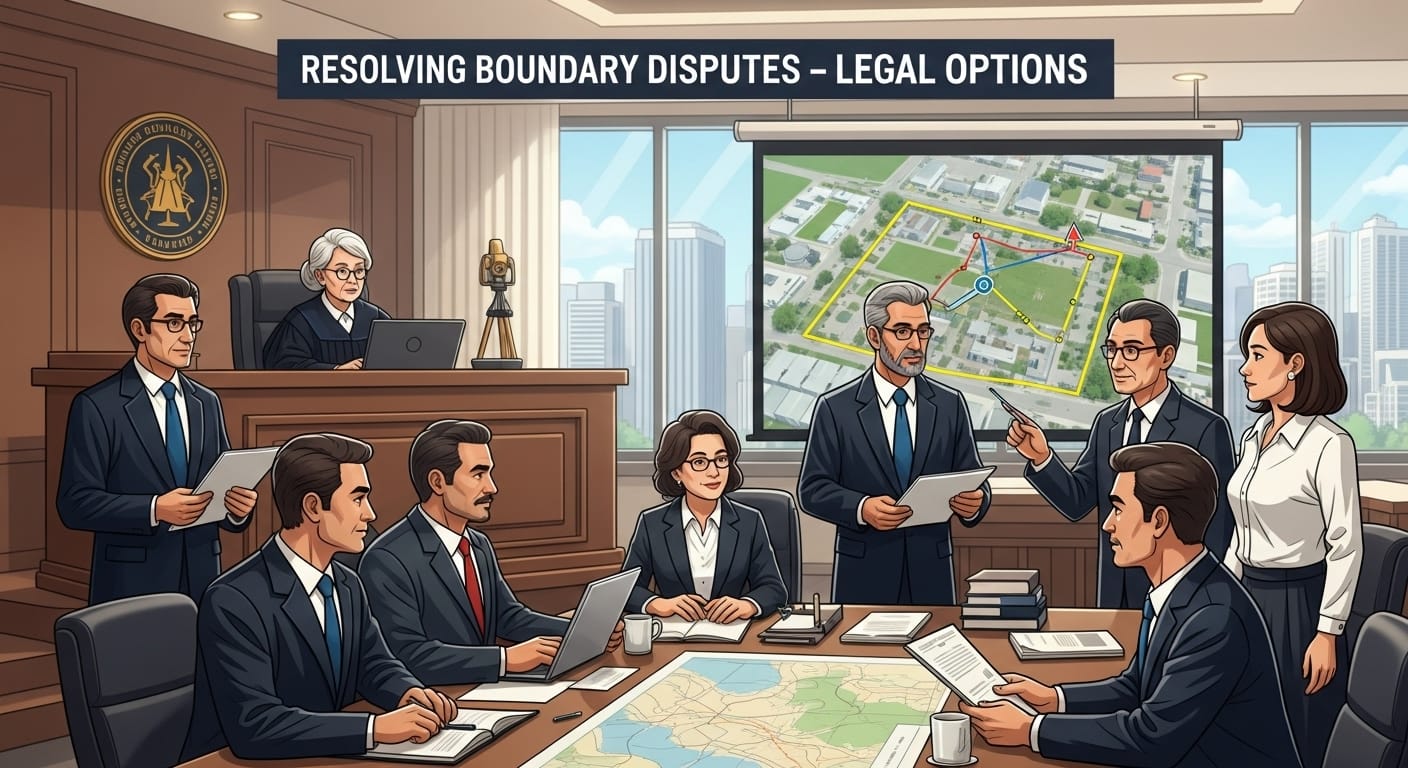Boundary disputes. Just the phrase can conjure up images of neighbors squabbling over a patch of grass or the location of a fence post. And honestly, is there anything more quintessentially human than arguing about where “your land” ends and “their land” begins?
You’d think that with satellite maps, GPS, and enough property laws to fill a library, we’d have figured this out by now. But no—boundary disputes remain a classic source of conflict.

Top Takeaways and Key Concepts
Identify the Root Cause: Determine whether disputes stem from unclear property lines, surveys, or miscommunication.
Communicate First: Attempt a polite conversation with your neighbor to resolve misunderstandings before escalating.
Use Professional Surveying: Hire a surveyor to establish accurate property boundaries and gather evidence.
Consider Mediation: Engage a neutral third party to reach a compromise without expensive litigation.
Know Legal Options: Understand adverse possession, court procedures, and title insurance to protect property rights.
Summary of This Article
The article explores boundary disputes, emphasizing that conflicts often arise from unclear property lines, old surveys, or miscommunication. It advises attempting neighborly communication first and then hiring a professional surveyor to clarify boundaries. Mediation is recommended as a cost-effective, peaceful alternative to litigation. If disputes persist, legal action, including knowledge of adverse possession laws and leveraging title insurance, can provide resolution. Preventive measures, like reviewing surveys before buying property, are highlighted as the best way to avoid disputes.
Please Note: This post may contain affiliate links. If you click one of them, we may receive a commission at no extra cost to you. As an Amazon Associate, I earn from qualifying purchases.
At their core, boundary disputes are about more than just land. They’re about pride, security, and the belief that your backyard barbecue shouldn’t have a view of your neighbor’s tomato garden.
Resolving these disputes takes patience, understanding, and sometimes, a bit of legal muscle. Let’s explore the maze of boundary disputes and the legal options available.
Understanding the Root Cause of Boundary Disputes

Most boundary disputes don’t start because someone woke up one day and decided to encroach on their neighbor’s property. More often, they stem from unclear property lines, old surveys, or miscommunication.
Imagine buying a house, planting a hedge, and then discovering years later that your prized landscaping is technically next door. Awkward, right?
By the way, disputes can also arise when land records conflict. One deed might say the property ends at the oak tree, while another references a long-gone fence. It’s like a historical game of telephone, except the stakes involve land instead of playground gossip.
Why Communication Should Be Your First Step

Before calling in the cavalry—or a lawyer—it’s a good idea to try talking to your neighbor. I know, this can sound about as appealing as unclogging a drain, but it’s often the simplest way to resolve a dispute. You’d be surprised how many disagreements stem from misunderstandings rather than malice.
To be fair, some neighbors are easier to deal with than others. If your neighbor is reasonable, a polite conversation can lead to a compromise. If not, well, that’s when you might need to consider other options.
Surveying the Land
If communication fails, the next logical step is to call in a professional surveyor. These folks specialize in determining where property lines actually are, based on deeds, historical records, and all kinds of technical measurements. Think of them as land detectives, but with less drama and fewer trench coats.
Interestingly enough, a new survey can clear up years of confusion. However, if the survey results don’t align with what you or your neighbor believe, it can escalate the dispute. Still, having an accurate map of the property is invaluable if the matter heads to court.
Mediation as a Peaceful Solution
Mediation is like couples therapy for neighbors. A neutral third party steps in to help both sides come to an agreement without the need for a courtroom showdown. It’s faster, cheaper, and less stressful than litigation, and it often preserves the neighborly relationship—or at least what’s left of it.
On the other hand, mediation only works if both parties are willing to compromise. If your neighbor refuses to budge or insists their property line is where their grandfather said it was in 1952, mediation might not be the answer.
Adverse Possession and Its Implications
Adverse possession is one of those legal concepts that sounds more dramatic than it is. Essentially, it means that if someone uses a piece of land openly and continuously for a certain number of years, they might be able to claim ownership of it.
To be fair, adverse possession laws vary by state, and they usually require specific conditions to be met. But it’s worth knowing about, especially if your neighbor has been using your land for decades without your permission.
Taking the Matter to Court
If all else fails, litigation may be necessary. This is where you’ll need a lawyer to present your case and argue why the property line is where you say it is. Court cases can be lengthy and expensive, but they do provide a definitive resolution.
Speaking of which, going to court isn’t for the faint of heart. You’ll need to gather evidence, such as surveys, historical documents, and possibly even witness testimony. But if the land in question is valuable or the principle is important to you, it might be worth the effort.
The Role of Title Insurance
Title insurance is like a safety net for property owners. It protects against financial loss due to title defects, such as boundary disputes. If you have title insurance, it might cover the costs of resolving the dispute, including legal fees.
Interestingly enough, not all policies are created equal, so it’s worth reviewing yours to see what it includes. If you’re buying property, investing in title insurance can save you a lot of stress down the road.
Why Prevention Is the Best Cure
The best way to deal with boundary disputes is to avoid them in the first place. That means doing your homework before buying property, reviewing surveys, and understanding where the property lines are.
On the other hand, if you’re already in a dispute, clear communication and a willingness to compromise can go a long way. And if that doesn’t work, well, now you know your legal options.
Resources:
Legal Options for Resolving Boundary Disputes
http://www.legalguide.com/boundary-disputes
Understanding Adverse Possession Laws
http://www.lawinfo.com/adverse-possession
Mediation Services for Property Disputes
http://www.mediationhelp.org/property-issues
Frequently Asked Questions
What are the common causes of boundary disputes?
Boundary disputes often arise from unclear property lines, outdated surveys, conflicting deeds, or simple miscommunication between neighboring property owners.
Should I talk to my neighbor before taking legal action?
Yes. Open communication can often resolve misunderstandings without legal intervention and may prevent unnecessary conflict or expenses.
How can a professional surveyor help in a boundary dispute?
A licensed surveyor can accurately determine property boundaries using legal records and measurements, providing essential evidence for resolving disagreements.
What is mediation and how can it help resolve property disputes?
Mediation involves a neutral third party who helps both sides reach a compromise. It’s typically faster, cheaper, and less stressful than going to court.
What does “adverse possession” mean in property law?
Adverse possession allows a person to gain legal ownership of land if they’ve used it openly and continuously for a set number of years under state law.
When should I consider taking a boundary dispute to court?
Court action is appropriate when communication, surveys, and mediation fail to resolve the issue, and legal ownership or land value makes it worth pursuing.
Can title insurance help with boundary disputes?
Yes. Title insurance can cover financial losses or legal costs associated with disputes over property boundaries or ownership errors in recorded titles.

Kevin Collier is a legal expert passionate about simplifying complex legal concepts for everyday individuals. With a focus on providing clear, practical information, he covers a wide range of topics, including rights, responsibilities, and legal procedures. Kevin aims to empower readers with the knowledge they need to navigate the legal landscape confidently, ensuring they can make informed decisions regarding their legal matters. Through insightful articles and easy-to-understand resources, he helps demystify the law, making it accessible to all.










